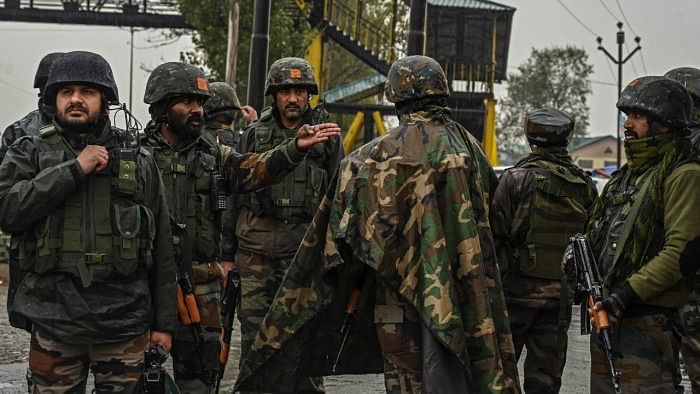
Once during a Lok Sabha debate, Atal Bihari Vajpayee said, "Lagta hai ghari ki sui ghoom ke usi jagah laut aayi hai (It appears the hands of the clock have come back to the position from where we all started with)." The sentence aptly applies to Nagaland and its story of insurgency.
After decades perhaps, Nagaland has made it to the front pages of the national dailies and also international news headlines. But sadly, yet again, for the wrong reasons. The year 2021 will go down in the memory with heartbreaking stories of the killings of innocent Nagas. The policymakers are again either clueless or, like the 1960s and 70s, yet again engaged in a never-ending cat and mouse game.
The state government under the Nationalist Democratic Progressive Party (NDPP)-Bharatiya Janata Party (BJP)-Naga People's Front (NPF) combine has rekindled the old demand for the repeal of the Armed Forces Special Powers Act (AFSPA). It has remained enforced in the state since 1958. But it can do precious little beyond this.
Also Read | Centre declares entire Nagaland 'disturbed area' as demand for AFSPA withdrawal continues
On December 30, 2021, the AFSPA was extended for six months, and the Home Ministry gazette notification stated that Nagaland is disturbed and is in a dangerous condition. However, the Centre has also set up the AFSPA review panel. There is a state government SIT (special investigation team), and the army has ordered its mandatory court of inquiry into the Oting shootout of December 4 that claimed 14 Naga lives. On December 5, one Assam Rifles personnel also died.
However, these numbers are ugly reminders of yesteryears and should instead open up the space for taking effective corrective steps. If there is any clear message from the Naga hills in 2021, the diagnosis should not become worse than the malady.
N Kitovi Zhimomi, the convener of the Naga National Political Groups (NNPGs), an umbrella body of Naga militant groups, is understood to be keen for the final solution agreement at the earliest. Reportedly, Zhimomi told a Delhi functionary who is in the know of things, "We Nagas are more than sincere this time. Let us have the peace pact at the earliest. Further delay will result in more Oting type blunders and bloodshed".
That is perhaps another message of the calendar year 2021. The Nagas who agree with this version say that the AFSPA or army deployment-related issues could die a natural death only if there is a permanent solution to the Naga insurgency issue that started around the 1940s.
When there is a problem in a tree, cutting down branches cannot help, said one senior NNPG functionary contacted from Delhi. "Let us get at the root. The AFSPA is only a branch. The problems of army deployment can be eradicated when we ink the peace pact. Nothing more, nothing less," he said.
Now, as the tumultuous year comes to an end, it is worth pointing out that Nagaland also made news with its supply of Bhut Jolokia, or ghost pepper, to London during the year. Even Prime Minister Narendra Modi tweeted about it.
The Naga handicrafts and handlooms have a special demand across the globe. Sources say the proposed peace pact, among other things, will try to ensure more investments, especially from the private sector, to promote the tourism and hotel industry and also set up other industries. However, there is perhaps a need to take more 'pragmatic' steps to augment private and corporate investments in Nagaland and other parts of the northeast.
Minute studies reveal that the elephant in the room is the Bengal Eastern Frontier Regulation (BEFR) Act 1873, which relates to the Inner Liner Permit (ILP) regulations. Under the ILP provisions, 'outsiders' to Nagaland and a few other states cannot enter beyond the demarcated line without a license paper strictly for a week or less.
Students' organisations and others have always suggested that the ILP norms be strictly implemented. However, it ought to be appreciated that as a constitutional tool, the ILP or, for that matter, the BEFR Act have failed to check the 'influx' of illegal Bangladeshi immigrants.
Like other northeastern states, the Bangladeshi immigrants have allegedly 'found a place' to stay and thrive in some parts of Nagaland. But some approaches towards the entire issue have only discouraged corporate investment. Power generation projects have in the past lingered due to land compensation issues, and other natural resources have not been used.
The year 2021 should finally perhaps put an end to the use of romanticised labels such as 'hotbed of extremism' for the state. Nagaland awaits the new dawn. It is too keen to welcome 2022 with peace and tranquillity. Everyone should do their bit.
(The writer is a New Delhi based journalist.)
Disclaimer: The views expressed above are the author's own. They do not necessarily reflect the views of DH.
Check out DH's latest videos